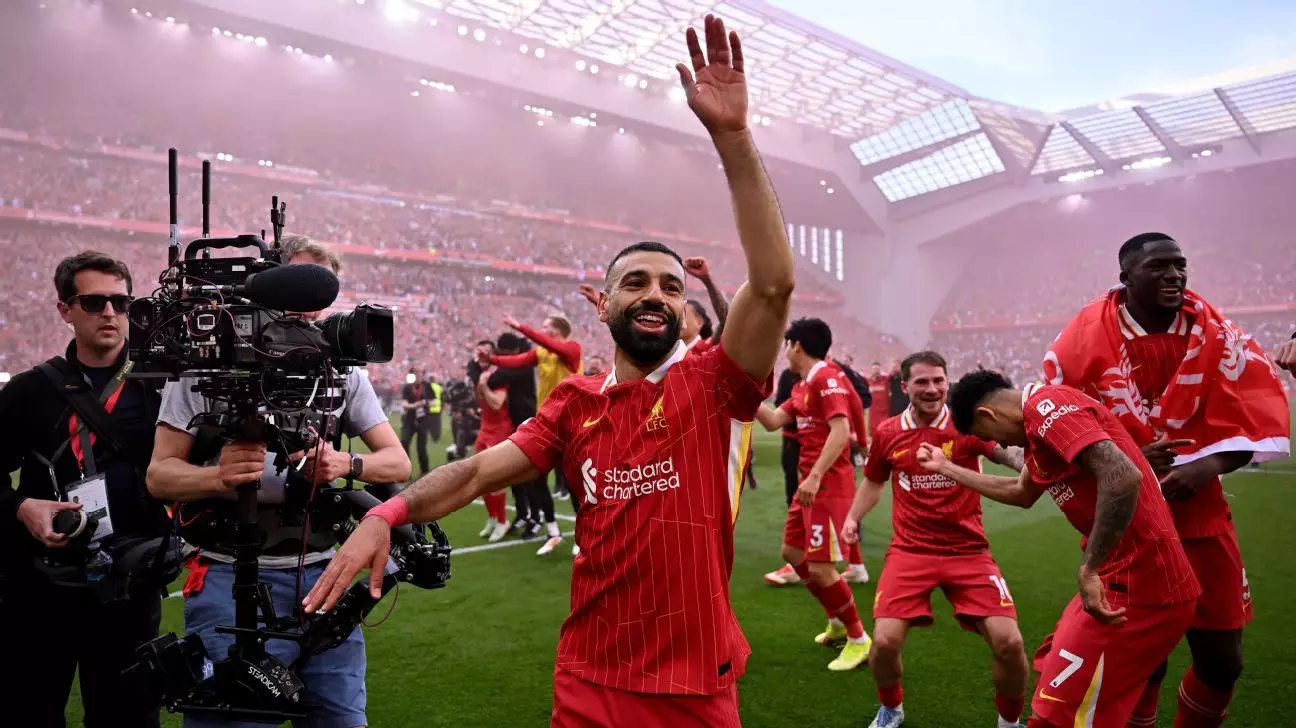Every year, the Football Writers’ Association Player of the Year award embodies the passion and prowess of English soccer, standing tall as both a tradition and a testament to individual excellence in the sport. Since its inception in 1948, it has celebrated some of football’s brightest stars, and with the announcement of the 2024 award just around the corner, many are already speculating about the rightful recipient. Last year, it was the exceptional Phil Foden who took home the honor, showing the evolution of talent in the Premier League landscape. Notably, Mohamed Salah has had previous success, solidifying his reputation as one of the league’s elite players. With Salah’s Liverpool firmly contending for the title under new management, the stage is set for yet another intriguing selection process—one that highlights both individual achievements and team success.
Dominance of Liverpool: The Case for Mohamed Salah
Amidst this year’s title race, it’s hard to overlook Mohamed Salah’s brilliance on the pitch. Leading the league not only in goals, but also assists, Salah’s stat line speaks volumes. His combination of these accolades is a rare feat that only a select few have managed in the history of the Premier League. With Liverpool’s assertive position atop the table, Salah’s contributions have been fundamental to their success; however, attributing the award solely based on team success may undermine the complexities of individual performances. Salah, who has often faced scrutiny regarding his contract negotiations and performance perceptions, managed to compartmentalize these distractions while delivering consistently stellar performances. His ability to remain focused and effective under pressure showcases an invaluable quality that is all too rare in professional sports.
Bruno Fernandes: A Beacon in Adversity
While Salah garners significant attention, one cannot overlook the exceptional journey of Bruno Fernandes at Manchester United. Despite the team’s dismal showing this season, sitting precariously close to relegation—a stark contrast to the club’s storied history—Fernandes stands out as a beacon of hope. His impressive tally of goals and assists amidst such adversity demonstrates a level of fortitude that is both commendable and extraordinary. Many may dismiss his candidacy due to the team’s overall records, but it is pertinent to recognize that true greatness often shines brightest in challenging environments. Fernandes has transformed from a player periodically criticized for his temperament to a robust leader and the driving force behind United’s attempts at redemption this season. His performance has been akin to a lone soldier battling insurmountable odds, capturing the essence of resilience that sports, at its core, encapsulates.
The Underrated Influence of Emerging Stars
As the spotlight often gravitates towards established stars, it is vital to acknowledge the rising talents in the Premier League whose contributions deserve recognition. Take, for instance, Chris Wood of Nottingham Forest. At 33, he has achieved remarkable success by racking up goal contributions in a team that traditionally relies on counter-attacking football. This fact highlights the notion that the measure of a player’s contribution can be multifaceted, transcending mere statistics. Football, after all, is a team sport; a player excelling in conditions that do not cater to their strengths demonstrates a profound level of technical skill and adaptability. Celebrating players like Wood shifts the narrative from solely exalting the marquee names to appreciating the broader spectrum of talent that enriches the league.
Other Contenders and Their Impact
It would also be remiss not to mention the invaluable contributions of players like Virgil van Dijk and Ryan Gravenberch, each solidifying their roles dynamically in a team as competitive as Liverpool. Van Dijk, often heralded as one of the league’s premier defenders, not only impacts the team’s tactical fluidity but also exemplifies leadership qualities that guide younger teammates through the tumultuous seasons. Meanwhile, Gravenberch’s transformation under Liverpool’s new managerial strategy shows how crucial it is to trust in emerging talent. His influence in midfield, which often goes unnoticed, has been pivotal in ensuring Liverpool maintains dominance in both domestic and European competitions.
The Broader Implications of Player Recognition
Ultimately, the discussion surrounding the Football Writers’ Association Player of the Year touches on broader themes concerning individual acknowledgment in team sports. Should the award strictly honor the standout performer in the league’s best squad, or should it also recognize those who deliver unmatched performances against the odds? The tradition of rewarding individual brilliance cannot falter; rather, it should expand to embrace diverse talents contributing to the fabric of the Premier League. Finding the equilibrium in honoring those who thrive with established teams and those who uplift their squads amidst hardship is the perennial struggle that must evolve with the sport itself. Each year, as we reflect upon who stands out, we further our understanding of what it truly means to be a beacon of excellence in such a competitive environment.

